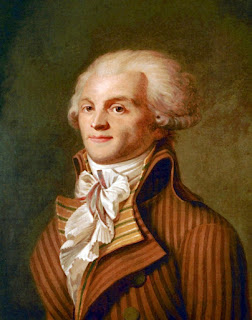Robespierre and Rees-Mogg: Verhofstadt's chalk-mark
In saying that "the guillotine" awaits democratic politicians who are attempting to action the UK electorate's four-letter instruction to its Parliament, "leave the European Union", Guy Verhofstadt is doing much more than revealing his intentionally skewed understanding of the history of modern democracy.
He states that Jacob Rees-Mogg will suffer the fate of Robespierre because Robespierre's efforts "were not appreciated by the common men they claimed to represent" which, in his unique reading of history, is why Robespierre and his associates "all ended up at the guillotine".
Robespierre (below) did indeed end up at the guillotine - but not at the hands of the sans-culottes, the working-class men and women whom the revolutionaries expected to do the fighting and dying for them.
Robespierre was not happy that the new regime was the anicen régime mark 2, the same structures of oppression but overseen by the upper middle classes who were now the ruling classes. He wanted a redistribution of property, but the new regime did not want to give up the fine houses and lifestyles they had coveted for so long. So he, and his fellow egalitarians, were killed.
It's a pattern we've seen before, and in Britain. During the English Civil Wars, the Levellers demanded a more egalitarian society, and had their leaders executed; then, Gerrard Winstanley founded the True Levellers, also called the Diggers after their cultivation of common land. Winstanley wrote that his True Levellers would be small communities of minimally educated commoners, who would therefore be of minimal trouble to the state. He was given property by a grateful Establishment and lived out his life as a country squire, a lifestyle as far from that he had imagined for his True Levellers as one can imagine.
Similarly, in France, the new Establishment found itself unwilling to tolerate the egalitarianism brought in by the middle stage of the referendum in the shape of modern democracy. The franchise was extended only to men, but it was a start and, most threateningly to the Establishment, in some areas all men were enfranchised, and not just the richest as was the previous practice through which the vote was stitched up among a small cadre who had all gone to the same schools and knew each other.
Napoleon Bonaparte, who up to then had had an indifferent military career and was technically a deserter, was brought in to close down democracy. For good measure, the first country he invaded was Belgium, where revolutionary democracy had spread.
After both of Napoleon's Icarus-like falls, it fell to political philosophers to close down the Revolution, by which they meant close down the democracy which the Revolution had produced. Auguste Comte, mentored by Henri de Saint-Simon, came up with "Positive Philosophy", which became known as "Positivism".
Positivism is ostensibly about science, and refraining from saying anything that we do not positively know to be true about any phenomenon. However, positivism goes much further than this, and proposes a world government ruled by scientists, known as "technocrats", with the disenfranchised masses expected to be satisfied with a "Religion of the Cosmic Man". It goes without saying that technocracy would not be an equal-opportunities venture; technocrats would be chosen from the ranks of gilded dynasties who could afford to have their children educated in such a way as to be suitable for further training as technocrats. In other words, we would be back to rule by a small group which all went to the same school and know each other, which we're not too far from at the moment.
Technocracy has remained a glittering prize in the minds of those who see democracy as interference into the affairs of the ruling classes by the ordinary people they hate so fiercely. This is the true import of Guy Verhofstadt's intervention: democrats like Jacob Rees Mogg can be expected to face the harshest sanction merely because they are democrats, and as such are preventing first a continental technocracy then a global one from being put in place.
The reason is so close to our noses that we don't think about it very often. Democracy itself is a revolution. There are, hopefully, no guns and killings, unless the goal is to subvert democracy as with the weakest-link assassination of Jo Cox MP. This is how I described democracy in put it in "Planets and Meaning: A Phenomenology of Fate":
It would appear that Rees-Mogg has been given the equivalent of a chalk-mark on the back of his jacket, which in Glasgow pubs once upon a time was a way of marking somebody for very special attention. Going back to near the start of this post, we need to remember that Robespierre, to whom Verhofstadt pointedly compared him, was not murdered by the sans-culottes but by his fellow revolutionaries who felt that expropriating the offices of the former ruling classes was the right place to stop the revolution.
Will we now see the country's emotional temperature raised by stiletto-sharp soundbites in an effort to occasion a weakest-link assassination? If we do, we need to be ready to defend ourselves, our families and our democratic birthright by whatever means we are forced to, because once democracy's gone its return will be blocked at every juncture by the guilded, guilty elites.
He states that Jacob Rees-Mogg will suffer the fate of Robespierre because Robespierre's efforts "were not appreciated by the common men they claimed to represent" which, in his unique reading of history, is why Robespierre and his associates "all ended up at the guillotine".
Robespierre (below) did indeed end up at the guillotine - but not at the hands of the sans-culottes, the working-class men and women whom the revolutionaries expected to do the fighting and dying for them.
Robespierre was not happy that the new regime was the anicen régime mark 2, the same structures of oppression but overseen by the upper middle classes who were now the ruling classes. He wanted a redistribution of property, but the new regime did not want to give up the fine houses and lifestyles they had coveted for so long. So he, and his fellow egalitarians, were killed.
It's a pattern we've seen before, and in Britain. During the English Civil Wars, the Levellers demanded a more egalitarian society, and had their leaders executed; then, Gerrard Winstanley founded the True Levellers, also called the Diggers after their cultivation of common land. Winstanley wrote that his True Levellers would be small communities of minimally educated commoners, who would therefore be of minimal trouble to the state. He was given property by a grateful Establishment and lived out his life as a country squire, a lifestyle as far from that he had imagined for his True Levellers as one can imagine.
Similarly, in France, the new Establishment found itself unwilling to tolerate the egalitarianism brought in by the middle stage of the referendum in the shape of modern democracy. The franchise was extended only to men, but it was a start and, most threateningly to the Establishment, in some areas all men were enfranchised, and not just the richest as was the previous practice through which the vote was stitched up among a small cadre who had all gone to the same schools and knew each other.
Napoleon Bonaparte, who up to then had had an indifferent military career and was technically a deserter, was brought in to close down democracy. For good measure, the first country he invaded was Belgium, where revolutionary democracy had spread.
After both of Napoleon's Icarus-like falls, it fell to political philosophers to close down the Revolution, by which they meant close down the democracy which the Revolution had produced. Auguste Comte, mentored by Henri de Saint-Simon, came up with "Positive Philosophy", which became known as "Positivism".
Positivism is ostensibly about science, and refraining from saying anything that we do not positively know to be true about any phenomenon. However, positivism goes much further than this, and proposes a world government ruled by scientists, known as "technocrats", with the disenfranchised masses expected to be satisfied with a "Religion of the Cosmic Man". It goes without saying that technocracy would not be an equal-opportunities venture; technocrats would be chosen from the ranks of gilded dynasties who could afford to have their children educated in such a way as to be suitable for further training as technocrats. In other words, we would be back to rule by a small group which all went to the same school and know each other, which we're not too far from at the moment.
Technocracy has remained a glittering prize in the minds of those who see democracy as interference into the affairs of the ruling classes by the ordinary people they hate so fiercely. This is the true import of Guy Verhofstadt's intervention: democrats like Jacob Rees Mogg can be expected to face the harshest sanction merely because they are democrats, and as such are preventing first a continental technocracy then a global one from being put in place.
The reason is so close to our noses that we don't think about it very often. Democracy itself is a revolution. There are, hopefully, no guns and killings, unless the goal is to subvert democracy as with the weakest-link assassination of Jo Cox MP. This is how I described democracy in put it in "Planets and Meaning: A Phenomenology of Fate":
Forcing a rotation of elites is nothing short of a revolution, and that’s what democracy is: a slow-burning revolution, with every vote a figurative sword exercised in the cause either of changing the previous regime or maintaining it against challengers. Democracy, then, belongs squarely in the realm of Mars as it is, essentially, a (hopefully) bloodless civil war.
It would appear that Rees-Mogg has been given the equivalent of a chalk-mark on the back of his jacket, which in Glasgow pubs once upon a time was a way of marking somebody for very special attention. Going back to near the start of this post, we need to remember that Robespierre, to whom Verhofstadt pointedly compared him, was not murdered by the sans-culottes but by his fellow revolutionaries who felt that expropriating the offices of the former ruling classes was the right place to stop the revolution.
Will we now see the country's emotional temperature raised by stiletto-sharp soundbites in an effort to occasion a weakest-link assassination? If we do, we need to be ready to defend ourselves, our families and our democratic birthright by whatever means we are forced to, because once democracy's gone its return will be blocked at every juncture by the guilded, guilty elites.



Comments
Post a Comment